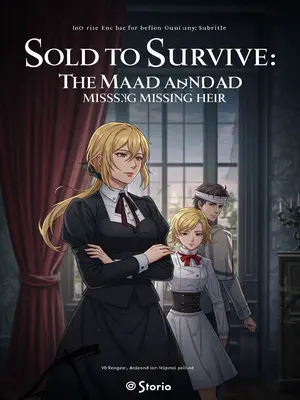Chapter 7: Silver Hollow’s Secrets
The young master had been raised by the old lady since childhood. In the hundred-year-old Whitaker mansion, only the Whitaker’s direct line remains, and he has just one legitimate son.
His name was Caleb Whitaker, and even as a boy he had the air of someone destined for power. Rumor had it his mother died young and his father traveled for business, leaving the old lady to raise him in that creaking mansion full of secrets.
Compared to us, whose lives are as cheap as dirt, the young master is as precious as gold.
I’d never seen anyone treated with such care. The staff tiptoed around him, the housekeepers fretted over his laundry, and even the cook would weep if he so much as skipped a meal. His every wish was an order.
Now, his Maplewood Suite, where he lives alone, had been under construction for three years. The suite is layered and elegant, with carved banisters, painted ceilings, winding hallways, rock gardens, ponds, and scenery for all four seasons.
The Maplewood Suite was the pride of the mansion: stained-glass windows, polished oak floors, little stone bridges over koi ponds in the garden. Each corner felt like a different season—dogwood blossoms in spring, scarlet leaves in autumn. It was the kind of place that made you forget the rest of the world existed.
The old lady and Mrs. Whitaker spent two months planning before finally assigning a full staff to the suite: two senior housekeepers, two first-class maids, four second-class maids, eight third-class maids, and twelve menial maids.
They planned the staff like a general planning a campaign. Schedules were posted on the pantry door, and everyone’s role was clearly marked: who served meals, who cleaned the windows, who arranged the fresh flowers. The hierarchy was ironclad.
Of the two housekeepers, Mrs. Carter is an old servant of the old lady—shrewd and capable; Mrs. Lewis is the young master’s former nanny—attentive and caring.
Mrs. Carter ruled with a sharp tongue and a quicker eye, while Mrs. Lewis always had a peppermint tucked in her apron for the young master. They watched over the rest of us like hawks and mother hens all rolled into one.
First-class maid Lillian was sent by Mrs. Whitaker—clever, skilled at needlework, as beautiful as a flower. I am the other first-class maid. The young master, amused by the contrast with Lillian’s name, called me Molly—good at cooking and tea.
Lillian was everything I wasn’t—dazzling, quick-witted, with a laugh like windchimes. The young master teased her about her name, calling her his “wildflower.” Me, I was just Molly: reliable, invisible, the one who always brought the right snack at the right time.
Lillian is beautiful, witty, and lively, and soon became familiar with the young master, serving him closely. For bathing and changing, for adding a touch of cologne, it was often Lillian at his side.
She would flutter around him, straightening his tie, adjusting his cufflinks, laughing at his jokes. Sometimes I’d catch a hint of jealousy in her smile, like she knew exactly how much power she had.
I, on the other hand, took on the troublesome tasks: meals, tea, social events, managing supplies—countless trivial matters. But I never minded the trouble. Every job for a beast of burden has to be done to the utmost.
I managed the ledgers, organized the pantry, coordinated dinner parties, kept track of his favorite teas. It was the kind of work that required patience and a sixth sense for moods. I took pride in making things run smoothly, even if no one noticed.
Not long after I started, I’d already learned the young master’s preferences: he likes to wear blue, prefers cursive handwriting, enjoys admiring snow on maple trees, drinks Earl Grey tea, and favors four-color petit fours.
I kept a mental list: always set out his blue tie for Sunday church, leave a fresh pad of calligraphy paper on his desk, brew his tea with just the right amount of lemon. When the maple trees turned red, I’d make sure the windows were clean so he could watch the leaves fall.
Whether the young master looked up or down, I could sense his mood. He found it more and more convenient to rely on me.
I’d become his shadow, anticipating needs before they were spoken. It was a subtle power—the quiet satisfaction of being needed, even if only as a background fixture.













